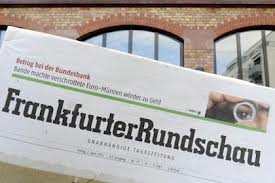I had been hopeful that the slow death of print newspapers would bypass Germany. Germany has a number of quality newspapers that have a national circulation. For the most part, German newspaper publishers have not been saddled with unsustainable levels of debt by private equity (Heuschrecke) investors/owners (witness the Los Angeles Times or the Chicago Tribute). The Frankfurter Rundschau had a number of talented editors and writers, and I often linked to its insightful op/ed pieces. But in this day and age, talent and quality are not enough:
APSI. Druck und Verlagshaus Frankfurt am Main GmbH,
the publisher of German newspaper Frankfurter Rundschau, has submitted a
statement on the newspaper's bankruptcy to the court of first instance,
Spiegel magazine reported, citing the court's spokesperson.Frankfurter Rundschau is an influential newspaper which generally
supports Germany's Social-Democratic Party. It has been published since
1945. Its circulation amounts to more than 160,000 issues.
German, Brzilian and French publishers have been aggressively fighting Google News and other Internet aggregators that pose a threat to their business model:
There’s a large boycott under way in Brazil, punishing legislation is
gaining momentum in Germany, and there is talk of a similar effort in
France.You wouldn’t know it by speaking to Eric Schmidt, Google’s executive
chairman. He takes the challenges to Google News seriously — he just
returned from talks with President François Hollande of France — but he
sounded sanguine on a phone call from Chicago.“We had some good discussions, and I would expect that we will reach
some kind of agreement by the end of the year,” he said.Don’t expect that agreement to acknowledge the principle of so-called
ancillary copyright, which has been pushed in Germany and elsewhere. It
suggests that Google and others should pay for featuring headlines and
the first few lines of an article, while Google asserts that this
constitutes fair use.
In France and Germany, publishers have found willing partners in their
national governments as they try to put the squeeze on Google.
Meanwhile, the Frankfurter Rundschau is putting on a brave face to its readers, insiting that "Es ist nicht das Ende der FR"(It's not over for the FR):
Die Frankfurter Rundschau hat am 1. August 1945 die zweite Lizenz einer
deutschen Tageszeitung nach dem Krieg bekommen, sie hat eine lange,
stolze und wechselvolle Geschichte erlebt. Wir werden alles dafür tun,
dass diese Geschichte weitergeht.(On August 1, 1945 the FR received the second license after the war for a German daily. It has a long, proud history, full of vicissitudes, and we will do everything to ensure that this history endures.)
Meanwhile there are reports that another quality German paper – the Financial Times Deutschland – close to bankruptcy.


